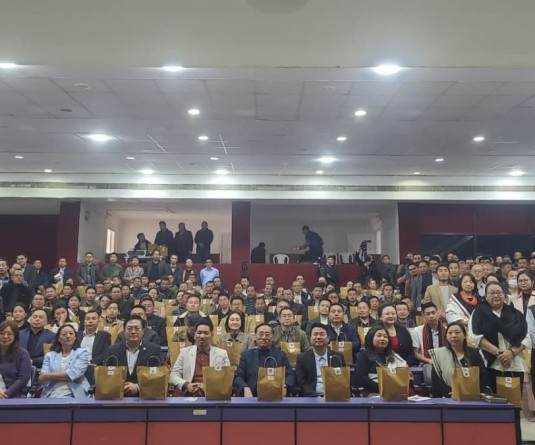
Nagas today are a very busy people. We are busy because we have to earn in order to spend. We are so caught up by the modern day consumerism that sadly we neglect certain things that made/make us what we are. Perhaps, globalisation and the resultant mass culture has had its greatest impact on the perceptions of the Nagas. It has made a direct attack on the ‘culture’ of the Nagas. It has diluted the very fabric of our tradition. Nagas were already precariously situated at the edge with the onset of Westernization. Now the lines are blurred to such an extent that we don’t know where we stand. Elderly people are extremely perplexed about the happenings around them. Adults are enmeshed within the business of ‘businesses’. Young people are swirling in the whirlpool of popular culture. Adolescents are hopping from one subculture to another as if inside a labyrinth trying to unravel what best suits their personalities. Mass culture is culture which is mass produced, distributed, marketed and consumed. Mass culture is the culture that is widely disseminated via mass communication and mass media. The rapid spread of mass culture implies the spread of western, modern-industrial consumer culture. By its own definition, “a large amount of material”, “mass” carries connotations of loss of identity and the self through anonymity, loneliness through social distance and impersonality, breakdown of institution of marriage through secondary relations, loss of folk community ties, selfishness through high mobility and conformity, etc.
In this contemporary world of post-everything, where concepts and things are fragmented, the intellectual need of gathering the reigns of multiplicity and delivering explanations must be sought after by the ‘guardians’ of academia. Should we allow our younger generation to swim with the current and drown in the ocean of mass culture and its ramifications? Look at what mass media is doing to them. Insulation against these giant waves of globalisation and mass culture is an impossibility and certainly not a solution. We are all part of it. Even the peasant in the remotest village of Nagaland is not insulated. How then, are we to cope with this confusion? Will talks about preserving one’s identity and culture work the magic? How do we preserve our identity and culture when they themselves are not static? What is actually one’s culture? If culture is dynamic, how to we hold on to it? Wouldn’t it be like chasing one’s tail?
This is not to suggest that we should retrieve all that is past and live it. However, the point here is to make intellectual assessments about our present lives by reflecting on the wisdom of our past. Just as every culture has it origin myth, so also does every culture have a repository of values, norms, customs, beliefs and practices. Edward Burnett Tylor’s celebrated definition of culture in ‘Primitive Culture’, published in 1871, is perhaps, the most comprehensive, inclusive and oft-quoted definition of culture in its ethnographic or anthropological sense: “that complex whole which includes knowledge, belief, art, morals, law, custom and any other capabilities and habit acquired by man as a member of society”.To disown them is to sell our birthright to the usurping claws of mass culture. To my understanding, we should understand the dichotomy between folk culture and mass culture in order to come to terms with the dynamics of the larger picture of one’s culture. Folk culture is at high risk because of the consumerist nature of mass culture. It is at risk of being exploited, subsumed or dissolved into the very matrix of mass culture. Nagas today are entirely caught up with the politics of power, be it political, social or economic power.
All our actions, our goals are directed towards acquiring more and more power. But what about cultural power? What about balancing and negotiating a mature cultural space whereby our society will not be tossed about like a ship in a storm by external influences?
There is no fast and ready answer. Nevertheless, under the rubric of cultural studies, one understands the dynamics of culture and an understanding of the world around us, and most importantly, about ourselves. While we are being bombarded everyday by the subtexts of mass and popular culture, we must learn to deal with some of these insidious influences with an intelligent approach. Young learners should be educated in this area so that they learn to look at the larger picture of Globalisation and its ramifications with prudence. For this reason, I strongly feel that one of the best approaches is to introduce cultural studies as a part of the curriculum of Higher Education.
This is a discipline which offers an alternative space for learners to negotiate between layers of realities. It is a platform for aspiring Naga scholars to study their vernacular languages and engage in translations. It is a site for excavating, documenting and transcreating folklore of the Nagas. It will establish academic scholarship in the various genres of Naga Indigenious Art, Music, Dance and Song. It will display the power relations of Naga society and culture, politics and culture, economics and culture, memory and culture. It will redefine various colonial concepts and restructure multiple perceptions of who we are. In other words, the introduction of this discipline will be a search for meaning.
Paul Willis, while negotiating the eclectic nature of cultural studies suggests that it is a discipline of the disciplines. A context-specific study of culture alone does not qualify it the space of cultural studies. As Chris Barker points out, “It remains difficult to pin down the boundaries of cultural studies as a coherent, unified, academic discipline with clear-cut substantive topics, concepts and methods that differentiate it from other disciplines. Cultural studies has always been a multi- or post-disciplinary field of inquiry which blurs the boundaries between itself and other ‘subjects’.” The inter-disciplinary character of this study makes it one of the core elements of post-modern studies. It deals with the post-modern predicament of societies, cultures, families and individuals. Since it is not limited by boundaries, it becomes the tool of understanding other disciplines and also provides the vehicles to negotiate modern day dilemmas, perplexities and crises.
Higher Education in Nagaland and it’s ‘guardians’ should wake up to the challenges faced by our society today. If education does not illuminate or attempt to answer the questions posed by modern day predicaments, how do we advance in the true sense of the word? Building mansions, wearing the most expensive clothes and driving the best SUVs through money unaccounted for does not make us culturally ‘advanced’ and ‘developed’. Jokes have their own culture-specific connotations. I remember a joke about how a man reported a missing wife. He was able to describe in detail the specifications of the car in which his wife drove away but he could not give a detailed description of his wife. Likewise, while we willingly fall victim to a consumerist market we neglect the higher dimensions of quality life. This prompts us to question the location of our priorities and how much weightage is given by the guardians of education to curriculum revision, on incorporating new disciplines and methodologies for upcoming scholars and the development of infrastructure of educational institutions. The discipline of Cultural Studies is not the last word in bringing maturity and stability to our society. It is only the beginning.
Dr. Lanurenla Assistant Professor, Department of English Fazl Ali College, Mokokchung






